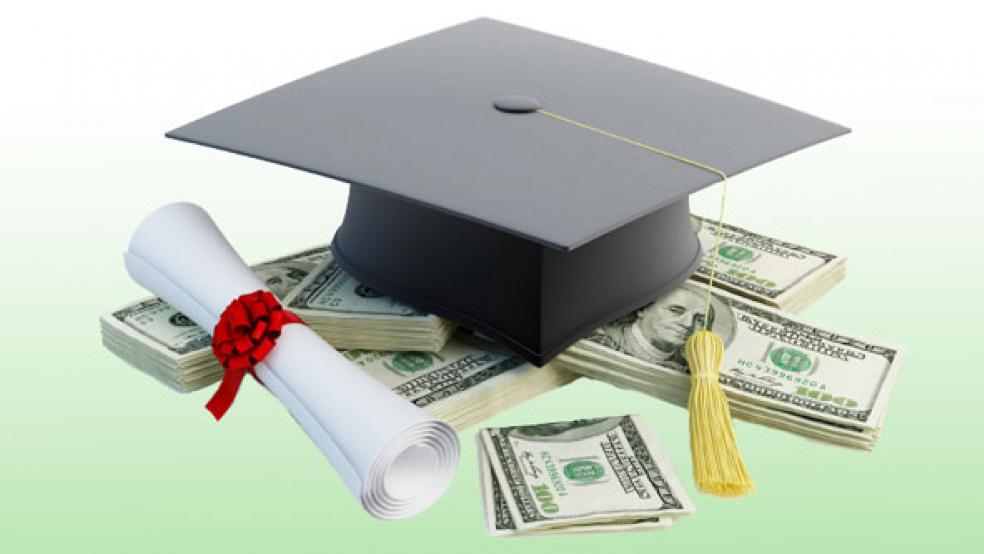It's been drummed into the heads of Americans for going on a century: Getting a college education is the best way to ensure future career and financial success.
Couple that mantra with government-backed programs keeping student loan rates low and what do you get? The monster known as American college tuition, something that's grown well past the rate of inflation for more than five decades. And it also has spawned a trillion-dollar student loan debt, much of which will never be repaid. The taxpayers will be left holding the bill, just like they were when the housing market went bust.
Because of the deep-held belief that Americans have about the value of a college education and de facto government backing, universities feel no marketplace pressure to rein in spending, force tenured faculty to actually teach or provide students with an education that will get them jobs.
But the glory days for the academic industry may be coming to an end. More and more people are questioning whether the most expensive colleges are really worth it. And there's solid economic evidence that skyrocketing student debt is eroding the economic advantages that graduates once enjoyed.
This week, we learned that researchers for the One Wisconsin Institute found that the home ownership rate among people paying off student loans is 36 percent lower than that of their peers without such debt. And the disparity can be seen at all income levels. In fact, the Census Bureau found that between 1993 and 2011, the average student loan debt for Americans with a bachelor's degree jumped by more than 82 percent, to $27,547. And guess what? All that is a good thing.
The more the public gets the caveat emptor spirit when it comes to choosing a post-high school path for themselves or their children, the better the choices will become.The free market has a way of creating healthy competition that way.
By any definition, there should be a lot more tuition price competition in the college market. The U.S. has more than 4,100 four- and two-year colleges. But because the government tinkers so much with everything from loan rates to student grants, the price options aren't as great as they should be. As long as the government makes sure loans—no matter how expensive—will be available to just about any student, exactly what incentive do colleges have to lower tuition prices?
The result is that most Americans don't have as much choice when it comes to how much they spend on college as they do when it comes to homes, cars and food.
All this brings me to what happened in the weeks leading up to my 25th high school reunion earlier this year. I was asked to be one of the speakers at the reunion dinner, and I decided to give a speech in tribute to my class and all my classmates had achieved over the past quarter-century.
As I did research about my class, it become increasingly obvious that for some reason my high school classmates were infinitely more impressive in just about every way than my classmates from the Ivy League college I attended.
Their median income was higher. The percentage of successful entrepreneurs was much greater. The number of female entrepreneurs was through the roof. The career diversity dwarfed that of my college, where just about every alum was a lawyer, broker or doctor. The list goes on.
But it occurred to me that the most successful of my high school classmates were also the ones who did NOT attend the so-called best colleges, or certainly not the most expensive. And perhaps that's not a coincidence.
Without the millstone of college debt around their necks, my high school friends-turned-entrepreneurs felt they had more freedom to take risks in the marketplace before and after they finished college. My college friends, on the other hand, had to deal with the pressures of paying back their loans and so opted for safer and what they thought would be better money-making careers.
On a more macro level, the trend is the same. With the tech and energy sectors driving the economy, the old law school/med school/grad school path to sure career safety and relative wealth is crumbling. Sure, there are higher-education pathways to lots of great energy and tech jobs, but those pathways are not necessary when young website creators are becoming billionaires and high school dropouts in Western Pennsylvania are making six-figure salaries fracking natural gas.
Don't get me wrong. Higher education is crucial for our society and one of the great strengths of the U.S. economy is what we have to offer in our universities, especially in the hard sciences. But a little downward pricing pressure is essential right now, especially for our most-elite schools, which, for all their push for diversity, are not churning out a diverse-enough group of entrepreneurs and trendsetters.
If we really want to make sure more of our young people get the chance to go to college, then let the free market take a whack at reducing tuition costs. All government meddling has done is made it more expensive for everyone, especially those taxpayers who never got to go to college in the first place.



